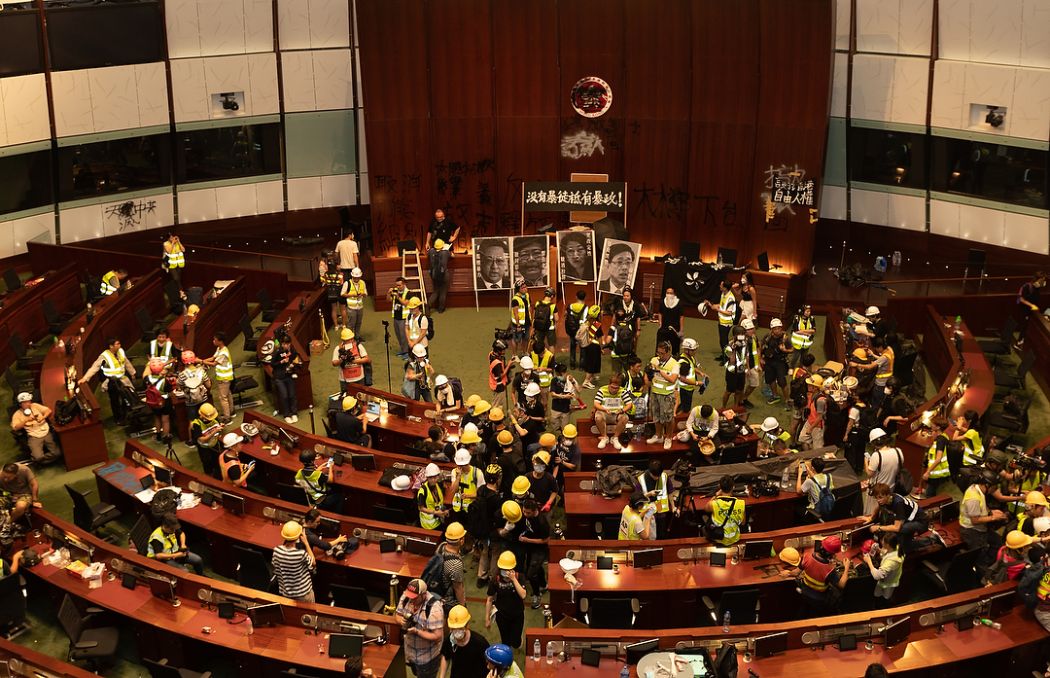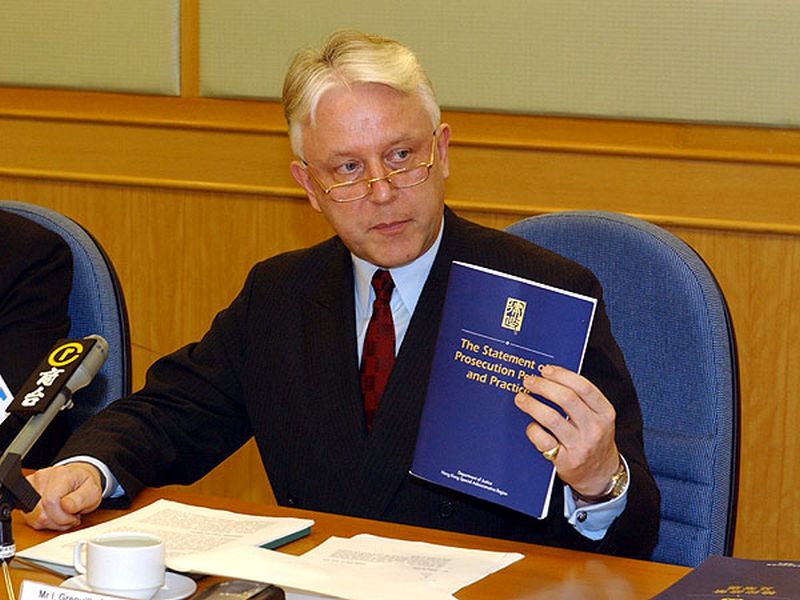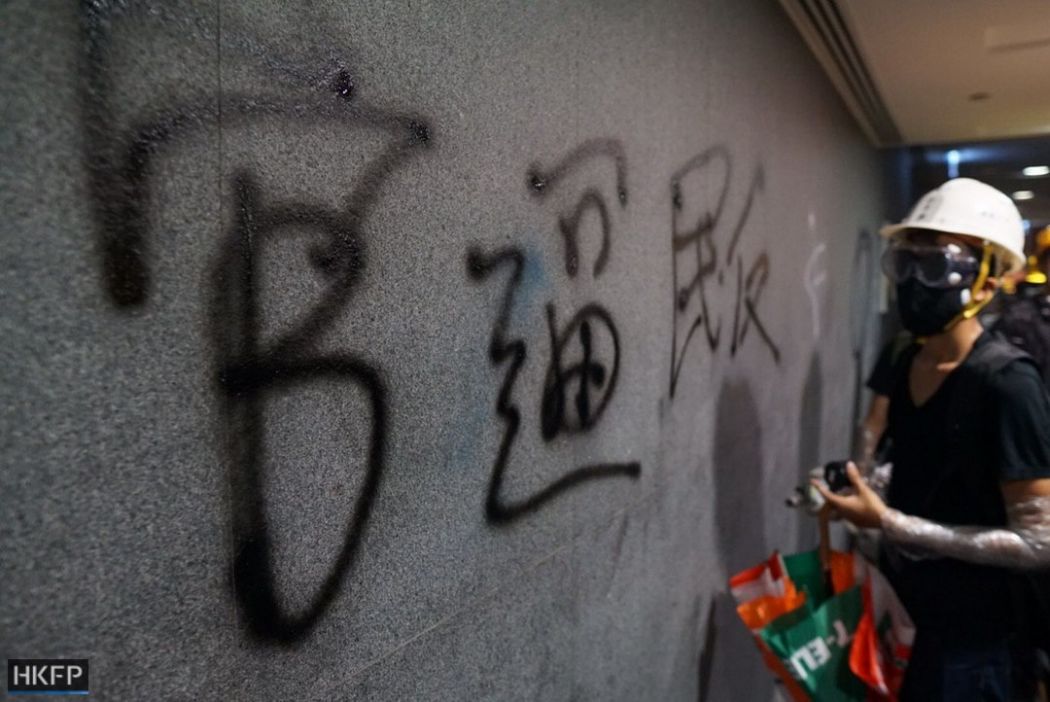They seek her here, they seek her there, they seek her everywhere, but where is the new-look, caring, sharing, new leaf turned over Carrie Lam?
The apology was nice. The promise to listen more was encouraging, and what have we seen since? Not much. The lady has disappeared into the Fuhrer bunker, meeting only groups of her presumably disgruntled supporters, police unions, and other implausible sources of information on what the people are singing.
I do not approve of people vandalising public buildings, but what was she expecting? Those who turn a deaf ear to polite requests should expect rude requests. Having made it impossible for young radicals to enter Legco as elected members the government should not be surprised that some of them are instead entering as burglars. This is what happens when you sabotage the electoral process.

I realise there is a matter of face involved here. The government does not wish to admit defeat. But we have to be realistic about these things. The extradition bill was a resounding mistake and resounding mistakes have consequences.
No doubt those concerned are now genuinely sorry, but sorrow, as Baloo points out in the Jungle Book, stays not punishment.
It is no good saying that you now want to put this divisive stuff behind us and get on with economic and livelihood issues. This put you in the position of the guest who kicks the dog, gropes your daughter, insults your wife and stubs a cigarette out on your sideboard, and then as you prepare to throw him out asks “what’s for dinner?”
In one respect the government has been lucky. Unlike the Umbrella movement, the protestors have generally only asked for things which are in the government’s gift. The problem with the CE election method was in Beijing. Current discontents concern matters which are clearly for our government to decide if it wishes to do so.
Under the circumstances it is a good idea, having identified a feasible concession, to make it in a Police Commissioner generous way which allows everyone concerned to tick it off their lists. Instead, we get grudging inch-by-inch concessions which annoy the government’s poodles without satisfying its critics.

Let us take the bill itself. The official line is now that this has been suspended. It will not be unsuspended and the government accepts that it will die when the Legco session ends next year.
Protestors, meanwhile, want the bill withdrawn. Unnecessary, say the officials. Well yes, but if the bill is unofficially dead why not have it officially dead rather than have the corpse lying around stinking the place up?
Then there is the matter of whether June 12 should be described as a riot. This is another issue where words are more of a problem than substance. Actually from a legal point of view it does not matter whether the Chief Executive or the Police Commissioner describe the event as a riot.
In the old days, back in the UK, this was different. When a public disorder took place a Justice of the Peace would turn up. In those days being a JP was a real – though part-time – job, not a cheap ornament bestowed on the government’s supporters.
The attending magistrate would then read out a picturesque paragraph specified in the Riot Act: “Our sovereign Lord the King chargeth and commandeth all persons, being assembled, immediately to disperse themselves, and peaceably to depart to their habitations, or to their lawful business, upon the pains contained in the act made in the first year of King George, for preventing tumults and riotous assemblies. God save the King.”

After an hour had passed the disorder then legally became a riot, and anyone still present could be charged and convicted whatever he or she was actually doing. The maximum penalty was three years in jail, or two with hard labour.
But this was not the system in the colonies. Hong Kong’s law in the matter is much simpler. Any assembly without police approval is an unlawful assembly. If violence occurs it is a riot and all those present are rioters whether they are personally violent or not. And the maximum penalty is ten years.
This is a bad law and the general reluctance to use it over the years is quite understandable. The suggestion that only those who have been violent will be prosecuted for rioting suggests a way out of the impasse. This would be to say that nobody would be charged with rioting; those who have been violent will be charged with the appropriate variation on assault and those who have not been violent will not be charged at all.
At this point we come to an interesting obstacle in the shape of former prosecutor Grenville Cross, who has informed everyone who would listen that any concession along these lines would be a gross infringement of the rule of law, which requires that prosecutions should be decided purely on the basis of whether a crime has been committed and whether there is a reasonable prospect of conviction.
But wait a minute! Is this not the Grenville Cross who explained at great length, many moons ago, why it was perfectly consistent with the rule of law for his boss the then Secretary for Justice to decide not to prosecute Sally Aw Sian, even though a crime had apparently been committed, and two of her underlings were eventually convicted of it?

Those of us who thought this was a little odd were told that we were being naïve and simplistic. Prosecutors had to consider not only whether a crime had been committed and a conviction was likely, but also whether a prosecution would be in the public interest.
It was perfectly proper, Mr Cross then thought, for a prosecutor to exercise his or her discretion on this point.
But according to Messrs Robertson and Nichols, whose book on media law has the useful quality of covering what you can do as well as what you can’t, when an official has a discretion whether to prosecute it is perfectly acceptable to express an opinion on how that discretion should be exercised.
So there would be no objection to some senior person expressing the view that it would not be in the public interest for the colonial antique to be used to prosecute protestors, and for the Secretary for Justice to agree. If that is what is wished for…
Then there is the matter of the inquiry into police conduct on June . First this elicited a flat no. Existing system perfectly satisfactory. Then the Independent Police Complaints people said they would set up a little task force to look at assaults and other misunderstandings involving the media.

Last week it emerged that the police complaints people were going to do a look at the whole thing. Carrie, while maintaining that this was entirely the complaints people’s idea, promptly endorsed it and set a deadline.
So we have another half-hearted concession which will satisfy nobody. The resulting inquiry will not have the powers of a proper commission, it will be undertaken by people who do not command instant trust, and it will be done in a tearing hurry.
This is an important omission because there is an important topic which calls for a proper inquiry.
During the protests in Hong Kong over the Tienanmen Massacre huge numbers of people turned out. If anyone carried an umbrella it was to keep the sun off. Protests against proposed national security legislation in 2003 were also huge and peaceful.
In 2005 the World Trade Organisation met in Hong Kong and a visiting group of Korean rice farmers introduced a rather different protest culture. Hong Kong people watched the ensuing tussles and admired the general restraint shown by the forces of order. Pepper spray in those days came in a little aerosol like the ones some ladies carry for self-defence.
There was some tear gas use on the last evening but it seemed that was more or less what the Korean farmers wanted.

After that things started to go downhill. Quite small protests attracted generous use of pepper spray. Protestors started taking an interest in goggles and face masks. On the first night of Occupy there was a barrage of tear gas. Umbrellas became a practical necessity because pepper now came in a sort of giant water pistol with which policemen could pick off people yards way.
The level of violence has steadily increased. It seems nowadays that two groups of young men turn up on these occasions, both dressed and equipped for their role in the proceedings, ready to rumble and united only in their contempt and indifference for the poor pacifists shuttling between the two sides trying to calm them down.
An ominous recent development is the appearance of chemical weapons on the protest side. This is worrying because the police chemical weapons have been tested and used elsewhere. They are known to be non-lethal, at least if the user follows the instructions on the can.
Something some oft-peppered protestor cooks up in his kitchen from household chemicals offers no such comfortable assurance, and may be much more dangerous.
It is, I fear, going to be very difficult to undo this long-term escalation in levels of violence. As Clausewitz put it, it is difficult to reinstate limits which depended largely on people not realising what was possible.

In the meantime, our leaders could usefully try to be more soothing, instead of seeking every opportunity to make partisan points. It is, for example, manifest nonsense to say that Legco must now be paralysed because its spiffy new chamber is unusable.
When the British House of Commons was bombed during the Blitz, members simply moved to a nearby chapel. Our universities, now subsiding for the summer, all have nice big meeting rooms with microphones and translation booths. In the 80s Legco used to meet in a rather unimpressive and very low tech hall which looked rather like a small suburban cinema.
Those who wish to work can work. Those who wish to blame the government’s critics for unrepaired hospitals, unraised wages or unfinanced projects need to remember what we are supposed to be doing: heel rifts, resolve conflicts, all that stuff. Or has that line been abandoned already?
